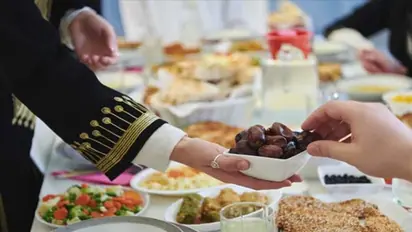Ramzan special: 10 delicacies for iftar you should know

Synopsis
As Ramadan month has begun with Muslim community across the world indulging in prayers, fasting, and charity, one of the interesting things to know is about the 'iftar' and the delicacies served to break the fast.
With the holy month of Ramadan setting in, Muslim community members observe fast, some pray five times, and also hold a special prayer called 'Tarabi'. The community members wake up early in the morning and eat light meals for 'Sehari', the beginning of fasting, and would wait for dusk hours to break the fast which is called iftar.
As the members will be fasting the whole day without even taking a glass of water, they will refresh themselves with different types of food and beverages after breaking the fast. It will be interesting to know ten delicacies that most homes arrange for iftar to break the fast within the family.
Also Read: Ramadan 2022: Know Dos and Don’ts for the holy month
1-- Varieties of dates and water
As per the tradition, while breaking the fast, the community takes one or two dates with water. It is said that during Ramadan, even Prophet Mumammed used to eat a few dates and break the fast. Secondly, dates are considered a superfood and fill you with energy.
2--Sharbat/Thandai
As the body generates heat due to fasting and to keep the stomach cool, the community generally consumes items like Khatira Gondh (a type of tree gum) and sabja beej, a black basil seed is added in cold milk and sugar. It keeps the stomach cool.
3--Shahi Tukda
The bread is fried in oil and once cooled, milk and sugar is added and served during iftar. The softness of the Shahi Tukda is liked mostly by children.
Also Read: Ramadan 2022: A look into Iftar traditions from across the world
4--Samosas
Samosas are very crispy and they fly like a hot cake from all the stalls. The samosas, like onion, potatoes and keema samosa (sliced and mashed mutton and chicken) is used as stuffing in the dough and fried and it makes it the 'dastarkhan' tablecloth of almost all Muslim homes during Ramadan.
5--Falooda
A rich jelly-like drink made from silky vermicelli, milk, cream, cut fruits, crushed ice, sliced dates, and crushed almonds. This mouth-watering delicacy is a must-try.
6--Aash/Ganji
The aash is nothing but porridge. It is made out of broken rice, moong or toor dhal, and mutton keema. Once cooked, it is preferred to be consumed hot with onion samosas. The community members prepare it in large quantities at all local Masjids and serve it to each household surrounding the Masjid. Ganji can also be made at home using a gas stove but the one made with firewood tastes better. A glass of Ganji fills up the stomach.
7-Sheer-Khurma
The dessert is prepared using vermicelli, dates, almonds, raisins, cardamom sugar and hot milk and condensed milk is added and cooked.
8--Cucumber and yoghurt salad
To keep the stomach very healthy, cucumber and yogurt salad is served. A lot of mint leaves and dried cherries are added for taste.
9--Hareera
It is a hot beverage made out of grounded almonds, cashew, cardamom and milk and sugar. During Ramadan, it is 'Hyderabad's Badam' that is on-demand.
10-Haleem
Haleem is a stew prepared by adding sliced mutton or chicken, lentils, cooked, in a slow flame and beaten with a pestle to make it soft. It is high energy as it contains calories.
Explore the latest Lifestyle News covering fashion, wellness, travel, Food and Recipes, and more. Stay updated with trending Health News, fitness tips, and expert insights to inspire your daily living. Discover personalized lifestyle trends that keep you stylish and informed. Download the Asianet News Official App from the Android Play Store and iPhone App Store for everything that adds value to your everyday life.